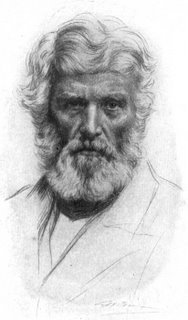 This is another article on the writers that shaped the literary style of F W Boreham. This posting looks at Thomas Carlyle (1795-1881)[1]:
This is another article on the writers that shaped the literary style of F W Boreham. This posting looks at Thomas Carlyle (1795-1881)[1]:Passionate Historian
A further literary influence upon Boreham was Thomas Carlyle. This Scottish writer reinforced Boreham’s passion for history, not as a succession of events but “as a process shaping the contemporary world, and sometimes as a process in which it is thought that the individual forces at work, whether personal, national, or purely abstract, can be examined and interpreted”.[2]
Importance of Heroes
Boreham’s numerous references to Carlyle indicated how his writing was inspired by Carlyle’s lifelong devotion to the study of history,[3] his encouragement to wonder[4] and his passion for hero-worship.[5]
Prophetic Voice
Boreham recognised Carlyle as “one of the mightiest moral forces of our time” and he admired the prophetic way in which Carlyle denounced all that was hollow and unreal.[6] Boreham described Carlyle as a “literary calamity” whose writing was “volcanic” and who gave to anyone reading him for the first time “the feeling that he is crossing a ploughed field in silk slippers”.[7] While Boreham did not attempt to imitate Carlyle’s style, he embraced many of his ideas and was challenged by Carlyle to consider how he might introduce a moral and prophetic dimension into his writing.
Geoff Pound
Image: Thomas Carlyle
[1] Thomas Carlyle was a celebrated essayist, historian and philosopher from Scotland. More information on Carlyle may be found in the Bloomsbury guide to English literature, 387-388.
[2] Roger Sharrock, ‘Carlyle and the sense of history’, Essays and studies collected for the English Association, 19 (1966): 74.
[3] F W Boreham, Faces in the fire (London: The Epworth Press, 1916), 42.
[4] Boreham, Mercury, 17 October 1942; Age, 22 January 1949.
[5] Boreham, When the swans fly high, 145.
[6] Boreham, Mercury, 2 March 1935.
[7] Boreham, Mercury, 2 March 1935.